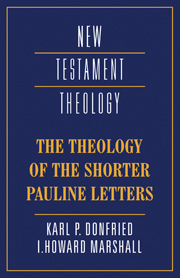Book contents
- Frontmatter
- Contents
- Editor's preface
- List of abbreviations
- THE THEOLOGY OF I THESSALONIANS
- Note on the biblical translations
- 1 The setting of 1 Thessalonians
- 2 The theology of 1 Thessalonians
- 3 1 Thessalonians, the Pauline corpus and Acts
- 4 The significance of 1 Thessalonians for today
- THE THEOLOGY OF 2 THESSALONIANS
- THE THEOLOGY OF PHILIPPIANS
- THE THEOLOGY OF PHILEMON
- Select bibliography
- Indices (Thessalonians)
- Indices (Philippians, Philemon)
4 - The significance of 1 Thessalonians for today
Published online by Cambridge University Press: 05 June 2012
- Frontmatter
- Contents
- Editor's preface
- List of abbreviations
- THE THEOLOGY OF I THESSALONIANS
- Note on the biblical translations
- 1 The setting of 1 Thessalonians
- 2 The theology of 1 Thessalonians
- 3 1 Thessalonians, the Pauline corpus and Acts
- 4 The significance of 1 Thessalonians for today
- THE THEOLOGY OF 2 THESSALONIANS
- THE THEOLOGY OF PHILIPPIANS
- THE THEOLOGY OF PHILEMON
- Select bibliography
- Indices (Thessalonians)
- Indices (Philippians, Philemon)
Summary
The message communicated by Paul to the Thessalonian church some two millennia ago has remarkable relevance for the contemporary church. Increasingly the church in the Western world finds itself in a pagan environment in which the Christian worldview and lifestyle are adhered to with diminishing conviction. ‘New age’ religions, many with a call to return to goddess worship, atheistic ideologies and deconstructed versions of ‘Christianity’ abound. To remain authentically Christian, to swim against the popular tides of public opinion, means that often discipleship involves subtle, and in some places overt, harassment, alienation and/or persecution. In this post-Constantinian age, as in the pre-Constantinian, the Christian church often finds itself in a minority position.
But this contemporary situation is paralleled in Pauline Thessalonica. There, too, the church was surrounded by pagan religions and a threatening political environment. It was a tiny minority, bullied, intimidated and persecuted, yet it flourished and had a profound impact upon the development of Christianity not only in Thessalonica but also in provinces of Macedonia and Achaia, and eventually well beyond. Why? What was the source of its power and momentum? How could it so compellingly advance God's cause despite strong opposition?
First, the ‘called-out [ekklēsia] of the Thessalonians’ were empowered and energised by a trans-human source, the gospel, the transformative and performative word of God which, accompanied by the Holy Spirit, allowed them to abandon idols with their death-bringing capacity and to worship the living and true God.
- Type
- Chapter
- Information
- The Theology of the Shorter Pauline Letters , pp. 73 - 80Publisher: Cambridge University PressPrint publication year: 1993



